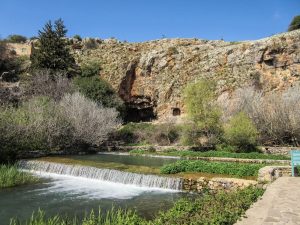Listen to Sermon Audio
Mark 8:27-31
Isaiah 53 (selected)
Romans 5:6-17
I have another question for you this morning. I call it the question of the ages. For in my mind, there’s no more important question that can be asked of any living human being residing on the face of this planet. For the answer to this question will forever shape the future of the one who accepts the challenge to answer it.
Matthew and Luke join Mark in providing this little vignette, in which Jesus takes His followers aside to ask this vital question: “Who do you say I am?”
But before we go any further, it is interesting to note the place Jesus took them to ask this vital question. Caesarea Philippi is located 25 miles north of the Sea of Galilee region which served as a base of operations for Jesus. It was in the time of Jesus a very modern Greco-Roman city located at the base of Mt. Hermon which rises up 9,200 feet above sea level. The question is why would Jesus take the time and trouble to make a

Caesarea Philippi was known for being associated with the four main religions of that part of the world at the time. There is a large cave that was said to have been the birthplace of the Greek god Pan. Also, note the head of the Jordan River which springs from underground to make its journey south to the Sea of Galilee and into the Dead Sea. We know that the Jordan River was very much associated with the Jewish religion, being mentioned 175 times in the Old Testament. Notice also in this picture the man-made cut-out in the face of the rock. This was one of no less than 14 little shrines that honored the Old Testament Canaanite storm-god Baal. Finally, Herod the Great had a large white marble Temple built here to honor Caesar Augustus, who demanded to be worshipped as a god.
So Jesus leads His followers on this pilgrimage to a place steeped in religion to ask, “With these four major world religions looking down on us, who do you say that I am? In other words, people, where and how do you think I fit in?”
It is for sure a question that is more relevant today than it was back then simply because there are so many more religions of the world.
And the question for us is the same as it was for those first followers of Christ. In the midst of the world’s religions, where does Jesus fit in? For us the question is “What makes Christianity different from all the other religions of the world?”
Years ago that very question was being discussed at a church conference. Some of the participants argued that Christianity is unique in teaching that God became man. But someone objected, saying that other religions teach similar doctrines. What about the resurrection? No, it was argued, other faiths believe that the dead rise again. The discussion grew heated. C. S. Lewis, a strong defender of Christianity, came in late, sat down, and asked, “What’s the rumpus all about?” When he learned that it was a debate about the uniqueness of Christianity, C. S. Lewis immediately commented, “Oh, that’s easy; grace.” 1
You better believe it! What makes the Christian religion different from all other religions? Grace!
What do the religions of the world have in common? They all believe in an after-life. And they believe that gaining entrance to that after-life is based upon how righteous one is in this life.
How many times a month do you worship? How many days a week do you read your religion’s holy book? How many hours a day do you pray to your god? How much money do you give to the religious institution of your choosing? How many times a day are you kind to someone else?
Or, on the other hand, if God is keeping track of righteousness points, how many swear words did you let fly today? Have you ever stolen anything from anyone? Ever coveted; that is, wished you had something that someone else has? Ever lied? How many times a day?
And Peter and the rest of these guys have been weaned on this kind of religious thinking that in order to merit heaven, you must live a righteous life.
And Peter is frustrated because he knows deep down inside that he messes up on a daily basis. And because he does, he lives in fear that he doesn’t measure up, he lives in fear that he is storing up more demerits than merits.
And in the midst of all this religiosity, Jesus asks, “Who do you say that I am?” Am I here as a representative of just another two-bit religion? What do you think, what do you say, who do you say I am?
And Peter says, “I believe you are the Messiah.”
And immediately Jesus begins to define the kind of Messiah He will be: “Then Jesus began to tell them that the Son of Man must suffer many terrible things and be rejected by the elders, the leading priests, and the teachers of religious law. He would be killed, but three days later he would rise from the dead” (Mark 8:31).
He is the one of whom Isaiah spoke in Isaiah 53:
He was despised and rejected, a man of sorrows, acquainted with
deepest grief” (53:3a). “But he was pierced for our rebellion, crushed for our sins” (53:5a). “All of us, like sheep, have strayed away. We have left God’s paths to follow our own. Yet the Lord laid on him the sins of us all” (53:6). “And because of his experience, my righteous servant will make it possible for many to be counted righteous, for He will bear all their sins (53:11b).
How will they be counted as righteous? “He will bear all their sins” (53:11b).
People are counted as righteous, that is right with God and eligible for heaven; not by their good works, not by what they do or refrain from doing, but rather by having their sins forgiven.
And how are our sins forgiven?
But he was pierced for our rebellion, crushed for our sins” (53:5a).
Jesus would offer His life upon the cross so that sins could be punished and therefore forgiven.
For God made Christ, who never sinned, to be the offering for our sin, so that we could be made right with God through Christ” (II Corinthians 5:21).
So who do you say Jesus is?
To answer that question requires us to come face to face with Jesus as he hangs upon the cross.
Bible scholar and pastor, N.T. Wright, tells the story about an archbishop who was hearing the confessions of three hardened teenagers. All three boys planned to make a joke out of it so as they each met with the archbishop they confessed to a long list of ridiculous and grievous sins that they had not committed. The archbishop, seeing through their bad practical joke, played along with the first two who ran out of the church laughing. But then he listened carefully to the third prankster, and before he got away told the young man, “Okay, you have confessed to these sins. Now I want you to do something to show your repentance. I want you to walk up to the far end of the church and I want you to look at the picture of Jesus hanging on the cross, and I want you to look right into His face and say, ‘You did all that for me, but I really don’t care.’ And I want you to do that three times.”

And so the boy went up to the front, looked at the picture of Jesus and said, “You did all that for me, but I really don’t care.” And then he said it a second time. But then he couldn’t say it the third time because as he stood there looking up at Jesus he broke down in tears.
And then N. T. Wright says, “The reason I know that story is true is that I was that young man. There is something about the cross; something about Jesus dying there for us which supersedes all the theological discussions, all the possibilities of how we explain it this way or that way and it grasps us. And when we are grasped by it, somehow we have a sense that what is grasping us is the love of God. 2
Who do you say Jesus is?
C.S. Lewis, the brilliant and once skeptical Cambridge University professor who was eventually won over by the evidence for Jesus, wrote:
Either this man was, and is, the Son of God; or else a madman or something worse. You can shut him up for a fool, or you can fall at his feet and call him Lord and God.” 3
Who do you believe Jesus to be? Was He crazy? It is difficult to reject Jesus as crazy when His teaching did so much to expose the craziness all around Him.
Was He out to take advantage of people? It is difficult to suspect him of being clever or manipulative when He lived so humbly and died so selflessly. Did He suffer from delusions of Messianic grandeur? It is difficult to accuse Him of this when there are so many Messianic prophecies that perfectly match the life of Christ.
If Jesus is who He claims to be, then our conclusions about Him, one way or the other, speak more of who we are than anything else. We can’t change the truth of who He is and what He has done. We can only change our orientation to the truth.
I sincerely hope and pray that you are not here today to earn religious points in order to merit heaven. Because if you are, it is a slap in the face of the One who died for you. So, who do you say that He is? It is not Jesus who is being put to the test by this question; we are!
Who do you say He is? It is life’s most important question precisely because its answer has a direct bearing on what happens after death.
1 https://bible.org/illustration/c-s-lewis
2 Adapted from N.T. Wright, Grasped by the Love of God, N.T. Wright Online; submitted by Kevin Miller, Wheaton, Illinois
3 https://www.thegospelcoalition.org/blogs/justin-taylor/is-c-s-lewiss-liar-lord-or-lunatic-argument-unsound/
